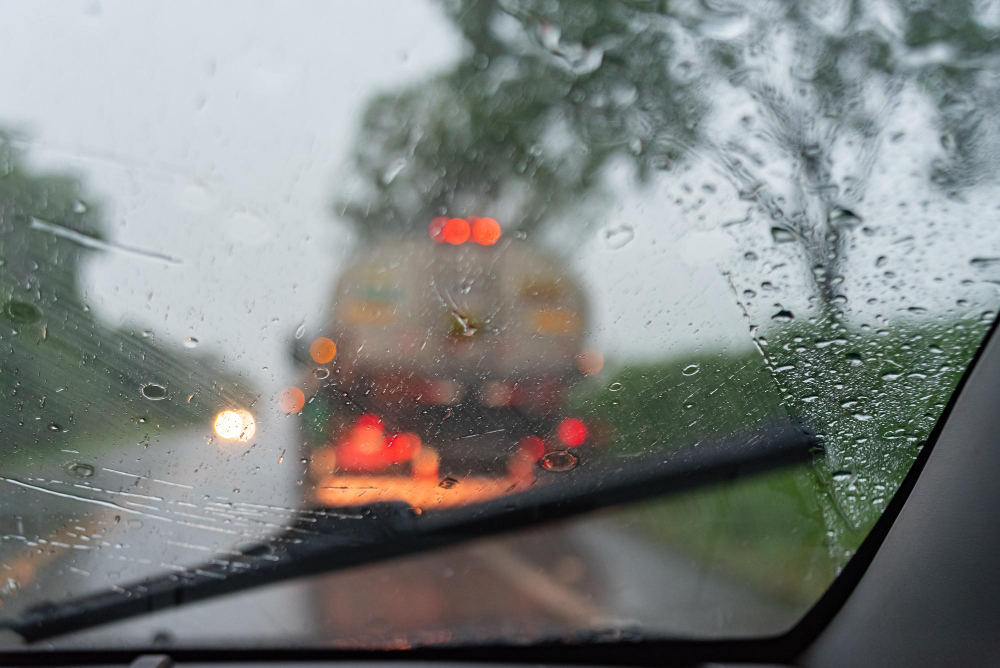Driving in the rain can pose significant challenges, particularly during hurricane season in Florida. Several factors, such as wet road surfaces, reduced visibility, and unpredictable weather conditions, demand extra caution from drivers.
Be Proactive:
Before hitting the road during rainy weather, take some time to prepare your vehicle. The tires should be properly inflated and have adequate tread depth to provide better traction. Also, check your windshield wipers. Make sure headlights and brake lights are in working order to maximize visibility.
Maintain adequate distance:
Reduce your speed as wet roads increase stopping distances. Also, maintain a safe distance from the vehicle for better reaction time in case of sudden stops or skids.
Use headlights to improve visibility:
When driving in the rain, it is advised to use your headlights even during the day. This helps enhance your visibility to other drivers. You should also ensure that your windshield is clear from fog or condensation by using the defogging setting on your car’s ventilation system.
Avoid cruise control:
With rain-slicked roads, your tires can lose traction. Moreover, your cruise control may cause your vehicle to accelerate unintentionally. It is best to maintain full control of your vehicle by driving manually.
Stay in the middle lanes:
During heavy rain, water tends to accumulate in the outside lanes, making them more prone to flooding. To reduce the risk, stay in the middle lanes as much as possible. These lanes typically have better drainage, which can improve your vehicle’s stability and traction.
Watch out for hydroplaning:
Hydroplaning occurs when a layer of water builds up between your tires and the road surface. It can lead to loss of control of your vehicle. To avoid hydroplaning, maintain a moderate speed and avoid sudden braking or acceleration.
Be cautious of standing water:
Florida’s flat terrain and heavy rainfall can result in standing water in low-lying areas. Avoid driving through visibly deep water, as it can conceal hazards and potentially damage your vehicle. If you encounter a flooded area, turn around and find an alternate route.
Be patient at intersections:
Approach intersections with caution, as vehicles may struggle to stop suddenly on wet roads. Allow ample time for traffic to clear before proceeding to prevent accidents or collisions.
Avoid distractions:
Distracted driving is dangerous in any weather condition, but it becomes even riskier during rainstorms. Keep your focus on the road and avoid distractions like using your phone, eating, or engaging in other activities. A split second of distraction can have severe consequences.
Purchase comprehensive auto insurance:
Despite taking all necessary precautions, accidents can still occur. Having holistic auto insurance coverage can provide financial protection in case of damage to your vehicle due to rain-related incidents. Auto insurance policies in Florida can often help cover the costs of repairing or replacing your vehicle.
Comprehensive auto insurance also offers coverage for non-weather-related incidents like theft, vandalism, and collisions with other vehicles.
In addition to providing coverage for vehicle damage, comprehensive auto insurance can also offer assistance and support in the aftermath of an accident. Many insurance providers offer services such as roadside assistance, which can be invaluable if your vehicle breaks down.
When it comes to finding reliable auto insurance in Fort Myers, Cathy Sink Agency is the name to trust. Whether you’re looking for basic liability coverage, our team can help you find the policy that fits your requirements.
Our personalized approach toward auto insurance in Fort Myers ensures that you receive the coverage you need without paying for unnecessary extras.
Remember, it’s better to be prepared and insured than to face unforeseen expenses. Stay safe and drive responsibly!

